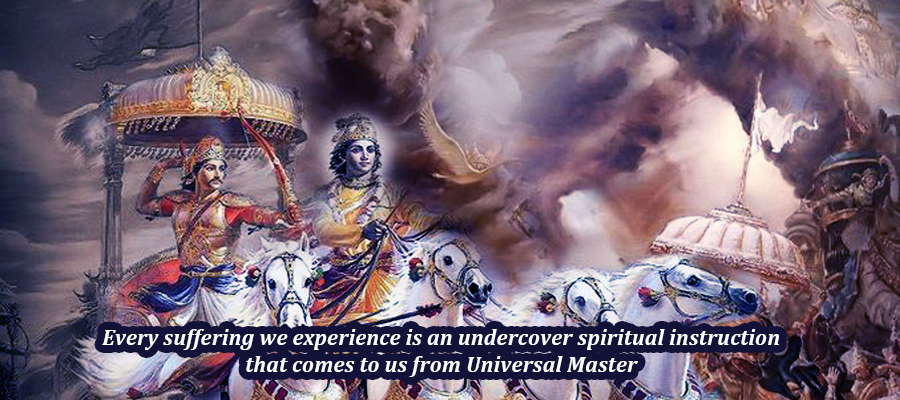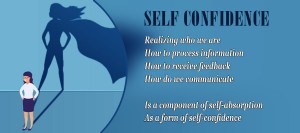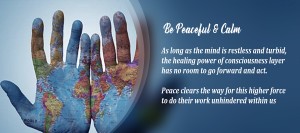Suffering forces change and free itself from the habitual movement of the mind. Suffering and awareness of suffering pushes beyond the comfort zone and counteracts the forces of life that are destructive and unstable or seek lasting solutions to the problem of suffering. Without suffering, it is difficult to undergo change or the possibility of finding new solutions.
Difficulties and problems are part of our lives. We experience them frequently in various ways. Depending upon how we respond to them or deal with them they may either strengthen us or weaken us. When problems become persistent and troublesome, we may call it an adverse situation.
Adversity is any hardship, difficulty, or suffering, which creates problems and interferes with our ability to live our lives normally or reach our goals. Depending upon the circumstances, adversity may last for a short time, or a long time, and in the process may toughen us, either teaching valuable lessons or demoralize us, pushing us into depression and withdrawal. Sometimes it leaves lasting and painful memories that are difficult to erase and at other times, it brings out the best in us and propels us towards success and self-growth. If we have a growth mindset, we will learn from your difficulties and move on, but if we have a rigid mindset, we may become stuck in our problems and do not appreciate the opportunity to learn from them.
Adversity is not simply having or not having money or wealth. We cannot say that adversity is the opposite of prosperity. Even rich and prosperous people go through periods of difficulties and face challenges. Adversity is a difficult phase in your life when you repeatedly experience failures, disappointments, and frustration.
How we respond to adversity depends upon how we perceive it and interpret it according to your values, beliefs, experience and understanding. When adversity strikes, most people initially suffer from negativity, fear, and depression, but quickly recover from it and try to deal with their problems. However, some continue to suffer and feel depressed and helpless. Some people emerge strongly from adversity, with determination and courage to set things right as they learn from it, while some develop distrust and suspicion, and remain depressed and discouraged. Factors that shape your life and thinking also shape your response to adversity, such as your upbringing, personal beliefs, and past events.
Maintaining focus and objectivity in adverse situations is difficult, but it is what we need. For that, we require a proper attitude and a philosophy of life, which can make you accept and absorb failures and setbacks, without losing our morale and faith in the beliefs and values, which you uphold.
A Lesson From Arjuna in Bhagavadgita
When Arjuna stood in the middle of the battlefield, between two large armies, and saw his cousin and his relations standing there on the battlefield on both sides, ready to wage a destructive war, he was suddenly overcome by sadness and a deep feeling of despair.
Moments like that come in everyone’s life. Some people react calmly, while others become very emotional. As a warrior who knew the harsh reality of war, Arjuna knew what would happen in such a big war. Every soldier who goes to a war zone to fight knows the risks involved.
When a person faces an uncertain situation, it is difficult to control emotions and focus on the task. That’s even more difficult when actions have the potential to hurt others who are known or related to us.
Arjuna was faced with a similar situation. He was filled with fear and sadness at the thought of the violence and bloodshed that might have caused the war, and the possible destruction of his own family members in it. Even though he was a reputed warrior, he did not have the spiritual strength, knowledge or wisdom to fight, without making himself mentally and emotionally unstable.
At that crucial moment, he felt that the benefits of war were far less attractive, both morally and socially than the possibility of great suffering and destruction that would occur. He became convinced that he was committing a destructive act and was on the verge of committing a grave sin by causing the destruction of his own family and friends.
The reason is also shaky when he thinks of the consequences, which usually occur when someone is in chaos. He thought that with the destruction of men in the family, their women would lose their virtue, and from that a mixture of castes would emerge. When he thought about that, he wondered how he could live with blood-stained hands after killing them and get a bad reputation as a murderer of his own family.
Wouldn’t it be better for him to live with a charity like a beggar than to kill so many relatives and parents from his own family to whom he always showed respect in the past?
Such were the moral and intellectual problems that flooded his mind, when he stood on the battlefield facing his enemies. Unable to resolve conflict, in confusion and worry, he resolves to face death, by not fighting rather than killing his relationship and living in sin.
One cannot blame Arjuna for his reaction as a human. Like most people, he expresses his confusion, feelings, and wobbly knowledge. The same thoughts and attitudes that influence our behavior and reasoning in difficult and critical situations arise in his mind, when he stands on his chariot on the battlefield, with disturbing thoughts, weak intelligence, weak courage, and weak judgment. In dealing with a major crisis, he spoke in the same way as many people would do when they faced the same situation.
From Mahabharata, we learn that Arjuna was no ordinary warrior. As an archer, he perfects unwavering concentration. He is a great warrior, who absorbs the beliefs and values of his day, and knows how to stay focused under pressure.
In addition, he is very religious, true, friendly, obedient, worldly, selfless, and human. When he puts down his bow and arrow and sits in the back seat of his train, falls and is sad, and refuses to fight, he is not motivated by fear or selfishness or self-doubt. There is no cynicism, insincerity, or falsehood in thought and behavior. He was truly concerned because he knew of his strength and the impending destruction of many people and the great warrior in his hands because he had superior strength and knowledge of many destructive weapons. His sadness is sincere, and his reaction is justified. He really wanted to avoid war for the sake of others, not to save himself.
His fear is also normal and can be understood. Whether it’s his orthodox views or sincere concern for the welfare of his family members, or his fears about the virtues of the women in his family, they are sincere and in accordance with the social and moral values of his day. We cannot judge him based on our values and standards. We also cannot find fault with him because of his skewed logic, his tendency to rationalize his fears and his confused thoughts about justification to avoid war. He only expressed the values of his day and the concerns of his conditioned thinking.
Worldly knowledge does not illuminate the suffering mind. It also does not help much to solve the problems of human life, mental knowledge does not have the power of divine enlightenment. The human mind, enveloped in ignorance and delusion, does not see light without much struggle. Knowledge, which is contained in it and which comes from various sources through the senses, is a foolish power, which lacks clarity, vision and true insight. It does not have the strength needed to carry its owner through the hardships of life. Being an instrument of imperfect knowledge and intelligence, which is not equipped to deal with the unknown and uncertain, it does not allow looking far into the future or facing life with calm and wisdom.
As an instrument of nature, it traps people deep in their own desires, drawing them far into the snares of life filled with desires rather than directing them toward light and liberation. The source is not light but an illusion. The goal is not to free people, but to get them involved and attached to the world. It does not let you seek the truth but mimic natural patterns. Created, nurtured and enriched by the senses, it holds its view in a very narrow vision of life, upholding values that do not try to reduce our suffering but increase it, not to show us the way but to lead us astray, not to encourage awareness centered on divine but perpetuates self-centered activities.
True freedom comes only when humans are willing to step outside the bounds of the conditioned mind and its limited knowledge of light. Suffering helps them in this process, to strengthen, relax their fears and struggle. As long as people do not like to go beyond their minds and senses and renounce pleasure and sense gratification, they remain attached to the world and to the impurity of their minds.
Therefore, sadness is a divine gift that is often accompanied by negative power to drive us from mental lethargy and delusion. The aim is to force change and transformation of aspects of personality, which make a person bound to his weaknesses. In most cases, it happens in a rather painful way, because people resist change and prefer to hold on to the way they beat themselves.
Suffering or sadness is only a twisted form of Divine Grace in which there are many truths and precious gems of wisdom. This is a force that seems negative but truly positive and transformative, a precursor to enlightenment in which the soul prepares for the next journey.
By directly illuminating mortality and the meaningfulness of our existence and by bringing us into direct confrontation with our own limitations and failures, it violently and painfully pushes us toward a loving God. It encourages us to believe in Him, depend on Him, surrender to Him and seek His help.
Thus, suffering is a true and faithful bearer of truth, an instrument of light, which chants mantras to humans, in an unpleasant and frightening way, to awaken them from pleasant dreams and illusions. It was a teacher who taught them how to live morally and correctly to remain free of sinful behavior and karmic poison. It’s when we get soaked in a cold row of suffering, we will find a rare opportunity to cleanse our impurities and become pure and divine.
If one is not burned in the fires of suffering, spiritual life is only a small possibility, distant dreams, debates or mere intellectual pleasure. Brahman explained that it did not illuminate the hearts of those who had not shed tears of distress. Sincere prayer cannot come from lips that have not trembled and cried because of divine intervention. Devotion does not flow in the hearts of people who are not softened by the sufferings of life.
Along the paths and paths carved by the hands of sorrow, mortal men walk, through problems and difficulties, to the eternal world which is at the same time a total negation of all that he has experienced and understood before. There is no other way that can shake the human mind out of the state of fainting and distortion where it descended. Arjuna suffered, and in the process became wise. He sought divine help and God taught him the song of duty, love, knowledge, wisdom, devotion, renunciation and other secrets to find freedom in himself. He revealed to him eternal heavenly wisdom by knowing which he could obtain freedom from suffering here and salvation thereafter.
Therefore, no matter how annoying that is, if difficulties arise, one should not try to escape from them. Instead, one must see as a divine opportunity, God’s grace, or gift and use it to perfect oneself, gain wisdom or insight, cultivate quality, or become a better human being.
Suffering is a poison that arises in life when it starts to stir it to find the happiness nectar. Unless we know how to deal with it and absorb it without being destroyed, we cannot progress far on the path of liberation. Even big gods and big demons have to deal with this poison when they rummage through the seas in search of sweet nectar (amrita) that will make them happy. When poison comes from the ocean and will threaten the world, Lord Shiva comes to the rescue. He fully drinks it and stores it in his throat, letting it not enter his mind or into his heart.
However, Arjuna could not do it. He let his emotions and troubled feelings into his heart and mind. He is mentally and emotionally disturbed by them and loses control. Thus the world inside him collapsed. However, in the end his suffering was beneficial to him, because of his good deeds in the past and the good karma he gained.
That eventually led him to be part of the great spiritual discourse and witness to the birth of philosophy that would provide comfort not only for him but also for the coming generations of men and women. That brought him to the brink of birth of a spiritual river that would flow forever in the mortal world, and quench the thirst of many seekers of salvation.





